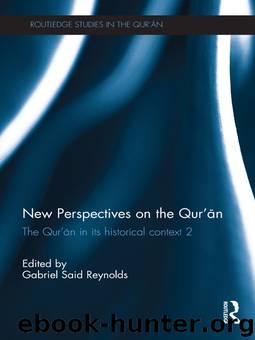New Perspectives on the Qur'an by Reynolds Gabriel Said;

Author:Reynolds, Gabriel Said;
Language: eng
Format: epub
Publisher: Routledge
Published: 2011-03-07T16:00:00+00:00
Part IV
The Qurʾān and its religious context
11 Al-Naṣārā in the Qurʾān
A hermeneutical reflection
Sidney Griffith
The appellation “Christians” (al-masīḥiyyūn),1 used to designate the followers of Jesus the Messiah (Christos), never appears in the Arabic Qurʾān. But Christians are clearly referred to in the text of the Islamic scripture under a number of other names and titles.2 Some fifty-four times the Qurʾān speaks of “Scripture People” (ahl al-kitāb), and in many instances the Christians are obviously included among them. Once in the Qurʾān Christians are called “Gospel People” (ahl al-injīl). Fourteen times the Qurʾān uses the term al-naṣārā (once in the sing., al-naṣrānī), as the most community-specific of the names and titles it employs to refer to the historical followers of ʿĪsā, the Messiah, Mary’s son, as the Qurʾān regularly speaks of Jesus of Nazareth, who, in the Islamic view, was the last Messenger God sent to the “Scripture People” prior to the mission of Muḥammad, “the seal of the prophets” (al-Aḥzāb [33] 40). The immediate suggestion of this difference in nomenclature is that the reader should not too hastily assume that the Christians included among the “Scripture People,” or those designated as “Gospel People,” or those called al-naṣārā in the Qurʾān, are in fact the same communities of people, a point to which we shall return in due course.
In non-Arabic interpretations of the Qurʾān, the name al-naṣārā is almost always translated “Christians,” albeit that the translation is not exact and, as we shall see, it may even camouflage what the Arabic scripture actually means to say in the passages in which the term is used. So the purpose of the present essay is to explore the sense of the term al-naṣārā in the Qurʾān from a number of perspectives, paying close attention to the frames of reference and the interpretive presumptions that determine the point of view in each instance. These include philological and lexical considerations, a study of the historical and cultural circumstances of the texts and the contexts in which the term is used in Qurʾānic passages, and an inquiry into the likely historical identity of the “Christians” to whose beliefs and practices the Qurʾān alludes in the passages in which the Christians concerned are called al-naṣārā.
Download
This site does not store any files on its server. We only index and link to content provided by other sites. Please contact the content providers to delete copyright contents if any and email us, we'll remove relevant links or contents immediately.
| Anthropology | Archaeology |
| Philosophy | Politics & Government |
| Social Sciences | Sociology |
| Women's Studies |
Cecilia; Or, Memoirs of an Heiress — Volume 1 by Fanny Burney(32068)
Cecilia; Or, Memoirs of an Heiress — Volume 3 by Fanny Burney(31463)
Cecilia; Or, Memoirs of an Heiress — Volume 2 by Fanny Burney(31413)
The Great Music City by Andrea Baker(30794)
We're Going to Need More Wine by Gabrielle Union(18641)
All the Missing Girls by Megan Miranda(14767)
Pimp by Iceberg Slim(13787)
Bombshells: Glamour Girls of a Lifetime by Sullivan Steve(13692)
Fifty Shades Freed by E L James(12923)
Talking to Strangers by Malcolm Gladwell(12887)
Norse Mythology by Gaiman Neil(12847)
For the Love of Europe by Rick Steves(11544)
Crazy Rich Asians by Kevin Kwan(8894)
Mindhunter: Inside the FBI's Elite Serial Crime Unit by John E. Douglas & Mark Olshaker(8708)
The Lost Art of Listening by Michael P. Nichols(7169)
Enlightenment Now: The Case for Reason, Science, Humanism, and Progress by Steven Pinker(6878)
The Four Agreements by Don Miguel Ruiz(6324)
Bad Blood by John Carreyrou(6283)
Weapons of Math Destruction by Cathy O'Neil(5842)
